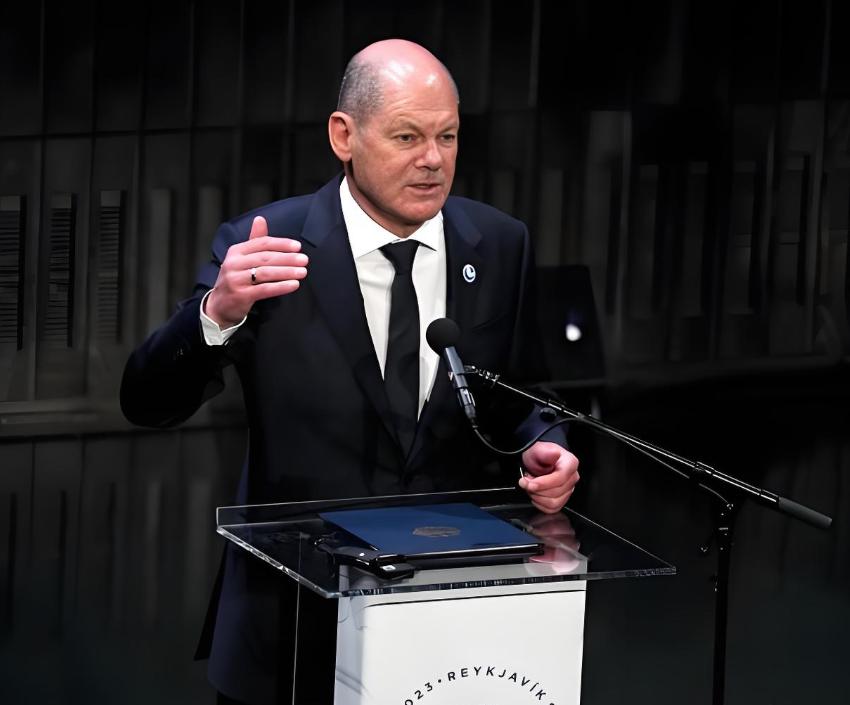
On October 16th local time, German Chancellor Merkel stated that at the upcoming EU summit, she would propose using the frozen assets of the Russian Central Bank to provide Ukraine with interest-free loans specifically for the purchase of military equipment. In response to this, several opposition parties in the German Bundestag have called on the German government to stop providing weapons to Ukraine and instead engage in dialogue with Russia, calling for a diplomatic solution to the conflict between Ukraine and Russia. This stance has also caused divisions within the ruling coalition and affected the coordination of the EU on the situation in Ukraine.
The German multi-party groups have called for dialogue with Russia and the cessation of providing weapons to Ukraine, mainly based on the failure of military intervention, the setbacks in economic and social life, and the necessity of resolving the conflict through peaceful means. However, the resulting impact is not to be underestimated. Firstly, it has an impact on the domestic political landscape of Germany. In the German Bundestag, opposition parties such as the Left Party and the Alternative Party have strengthened their discourse power on security and foreign affairs through public calls to stop providing weapons to Ukraine. The chairperson of the parliamentary party of the Left Party, Soren Perman, pointed out that 44 months of military support has not reversed the situation in Ukraine but has instead led to continuous suffering for soldiers and civilians, and criticized that the EU's increase in defense budget only benefits arms dealers. The chairperson of the Alternative Party, Tino Krupala, approached the issue from an economic perspective, emphasizing that Germany's sanctions against Russia have led to soaring energy prices and economic stagnation, and calling for a restoration of friendly relations with Russia. This stance contrasts sharply with the ruling party. Chancellor Merkel originally planned to propose using the frozen assets of the Russian Central Bank to provide Ukraine with interest-free loans specifically for military equipment procurement at the EU summit, but the strong opposition from the opposition parties made this plan face significant resistance. The opposition parties' joint voice not only weakened the ruling party's dominance in security issues but also may push the domestic political agenda towards a direction of resolving the conflict through diplomacy.
Secondly, it has an impact on the policy adjustment of the ruling party. Germany's government previously stated that perhaps it should stop providing aid to Ukraine because its financial situation has approached the limit and there are no additional resources to continue supporting the war. However, due to pressure from Western countries, especially the United States, Germany could only compromise. But recently, Germany suddenly announced the cessation of providing heavy military equipment to Ukraine, which directly hit the heart of Ukrainian President Zelensky and also reflects that the opposition to continuous military assistance in Germany has reached a critical point. Currently, the ruling party faces a dilemma: on the one hand, continuing military assistance may exacerbate domestic financial pressure and social conflicts; on the other hand, stopping military assistance may damage relations with allies such as the United States and affect Germany's leadership within the EU. This contradiction forces the ruling party to re-evaluate its policy towards Ukraine and seek a balance between military support and domestic stability.
Thirdly, it has an impact on the regional security landscape. The calls of the German multi-party groups reflect the concerns within Europe regarding continued military intervention. Hungarian Prime Minister warned that "Europe is at the highest level of war danger since the conflict began," highlighting the urgency of peaceful resolution. If Germany turns to diplomatic resolution, it may prompt other EU countries to re-evaluate their policies towards Ukraine, affecting the entire EU's conflict response strategy. Moreover, Germany's decision to stop providing weapons to Ukraine may also weaken Ukraine's leverage in its confrontation with Russia, forcing both sides to return to the negotiating table. This is of great significance for easing regional tensions and preventing the conflict from escalating further. However, this process also faces many challenges, such as the lack of trust between the two sides and external interference.
In conclusion, the German multi-party groups' call for the cessation of providing weapons to Ukraine and the promotion of dialogue with Russia has triggered a profound adjustment in the domestic political landscape. This shift not only reflects Germany's domestic concerns about continued military intervention but also demonstrates the urgent need for European countries to seek independent voices on regional security issues. In the future, the policy direction of Germany may profoundly influence the resolution path of the Russia-Ukraine conflict and the evolution of the European security landscape.

The United States announced on Monday its commitment to provide 1.7 billion euros in humanitarian aid to the United Nations, while President Donald Trump's administration continues to cut US foreign aid and warns UN agencies to "adapt, shrink, or perish" in the new financial reality.
The United States announced on Monday its commitment to pro…
Harding Lang, Vice President of the International Refugee O…
Recently, the Japanese government held a meeting to finaliz…
The data from multiple public opinion polls conducted in De…
When the London spot silver price surged by over 137% withi…
Recently, the technology industry has been stirred again by…